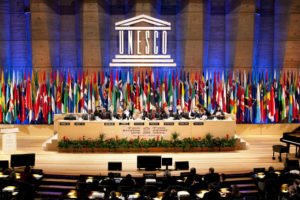
13 Feb Moving forward… but where do we go from here?
The act of interpreting has been taking place ever since two groups of people met but could not speak each other’s languages. A friend of mine, who is working on her doctoral dissertation, found this quote from the work of Marzena Chrobak[1]:
“In the Near East, the first mention of this profession comes from Ancient Sumer. One of the typical artefacts of this region – a clay tablet with a list of words in cuneiform (…) – probably dating back to the protodynastic period IIIa, i.e., 2600-2450 BCE – first contains the expression eme-bal, “to interpret,” literally, “to turn (bal) language (eme).” (p. 88)
 The importance of the interpreter’s role remained high throughout history: Ancient Egypt, Ancient Greece, the Roman Empire, China… Every chronicle of encounters or clashes between different civilizations includes accounts of the interpreters who made communication possible. In fact, without interpreters, many historical conquests and defeats would never have taken place. Yet, at some point, we lost that status; we lost the respect bestowed on interpreters and their role in society. (Was it because of the defeats?)
The importance of the interpreter’s role remained high throughout history: Ancient Egypt, Ancient Greece, the Roman Empire, China… Every chronicle of encounters or clashes between different civilizations includes accounts of the interpreters who made communication possible. In fact, without interpreters, many historical conquests and defeats would never have taken place. Yet, at some point, we lost that status; we lost the respect bestowed on interpreters and their role in society. (Was it because of the defeats?)
Maybe it was a spillover effect from the role interpreters played during the Spanish invasion of the “New World.” Maybe the decline in prestige has been caused by an unconscious association between the interpreters and those for whom we interpret, such as war criminals or enemy combatants. Whatever the reason, as of the 1900s—maybe as early as the 1800s—interpreters lost much of that privileged status we can see in the hieroglyphs of the Pharaohs’ tombs of Ancient Egypt.
 Only those who took on the role of conference interpreters, working for large international organizations like the UN, OAS, NATO, IMF, and others like them, have retained a respectable level of recognition as to the important—make that crucial—role interpreters play in a nation’s ability to communicate with others.
Only those who took on the role of conference interpreters, working for large international organizations like the UN, OAS, NATO, IMF, and others like them, have retained a respectable level of recognition as to the important—make that crucial—role interpreters play in a nation’s ability to communicate with others.
In public service—the legal, education, and healthcare sectors, for instance—not only have interpreters lost the prestige we once had, but more often than not we have been relegated to the role of “outsiders.” Rather than acknowledge the essential role interpreters play in furthering the democratic ideals of social equity, particularly in the United States, we are stigmatized as “intruders” in what I suppose would otherwise be a perfect monolingual, monocultural world.
Ah, but there is pushback! There is, among us, a warrior consciousness that refuses to bow down to the forces that attempt to keep us ostracized. There is, among us, a fighting spirit that refuses to remain on the fringes, where we are never fully accepted as equals, never fully recognized as professionals in our own right.
And yet… we are not quite there. We still have to clamor for proper conditions when we provide our services—like team interpreting or proper equipment. We still have to hue and cry when public-sector clients turn a deaf ear and a blind eye to the value of our services. At some point we have to overcome, we have to reach the point where we no longer have to tolerate disparaging attitudes and demeaning treatment. But how do we get there?
I honestly believe that we can do that only by joining forces and agreeing to move in the same direction. And I honestly believe that direction has to lead to the sort of internal and external controls that allow us to regulate who can “become an interpreter,” how interpreters are trained and educated, and who will ultimately be able to practice this profession in such critical areas as law, healthcare, and education. I see healthcare interpreters already there, having set up their own credentialing systems and educational requirements for those who want to practice in the public health field. I see interpreters in education starting to take the reins of their own destiny, working on the design of their own credentialing through an autonomous professional association. What I don’t see is interpreters in the legal field doing anything to free themselves from external controls, such as those of court administrators or judicial councils at state and federal levels. It sort of reminds me of my own island nation, colonized during the Spanish incursion into the “New World,” then colonized again, so a lot of people don’t know any other way of being… But I digress.
Judiciary interpreters were created by law, in a way. The profession was “formally recognized” upon the enactment of the Court Interpreters Act (28 USC §1827 et seq.), so the federal judiciary “occupied the field” by establishing a certification exam and setting the rules for the practice of spoken and sign language interpreting in legal settings. Everyone seems to be perfectly comfortable with those external impositions on the profession, and at one point some interpreters even shut down an excellent certification exam NAJIT had developed at great expense and through countless volunteer hours from many colleagues who helped with the development and validation of the test. We, as a profession, were on the right track, but then it seems as though everyone fell back into that initial complacency. I should clarify that sign language interpreters are also ahead of the curve here, having established long ago their own credentialing standards. Spoken language interpreters, however, remain far behind in the legal field.
Is it because we are afraid to rock the boat? Or are we intimidated by the lawyers and judges who essentially control our profession right now? Why are we stuck in this loop, continuously complaining about not being paid enough, or not having the right working conditions, of being undercut by non-professionals who claim to be interpreters, yet always one step shy of actually taking control of our profession? I don’t mean taking control of your own business practices (which you should, by the way). That is a horse of a different color. I mean taking control of credentialing at the national level, control of our performance standards (which are terribly obsolete), control of the training and education future members of this profession are offered or required to take.
Judiciary interpreting as a profession needs to shake off this decades-long lethargy, this “let someone else do it” attitude. I’m keeping an eye on one organization that seems to be doing just that: AAPTI. If they succeed, we may finally get to be the ones who control this profession. I am cheering them on and rooting for them.
[1] Chrobak, Marzena. “For a tin ingot: The archeology of oral interpretation.” Przekładaniec. A Journal of Literary Translation, Special Issue (2013): 87–101. doi:10.4467/16891864ePC.13.039.1456

Janis Palma has been a federally certified English<>Spanish judiciary interpreter since 1981. Her experience includes conference work in the private sector and seminar interpreting for the U.S. State Department. She has been a consultant for various higher education institutions, professional associations, and government agencies on judiciary interpreting and translating issues. She worked as an independent contractor for over twenty years in federal, state, and immigration courts around the U.S. before taking a full-time job. Janis joined the U.S. District Courts in Puerto Rico as a staff interpreter in April 2002 and retired in 2017. She now lives in San Antonio, Texas, embracing the joys of being a grandmother. She also enjoys volunteering for her professional associations, has been on the SSTI and TAJIT Boards, and is currently the past Chair of the NAJIT Board of Directors. Contact: palmajanis88@gmail.com
Main photo from “Le droit, enfant abandonné de l’épistémologie ?” by Richard Monvoisin at CORTECS, under the CC BY-SA 4.0 license. First body photo (cropped) taken from “The interpreting profession in Ancient Egypt” by Ingrid Piller at Language on the Move, under the CC BY 4.0 license. Second body photo (cropped) taken from “Unesco, solo mayúscula inicial” at fundéu RAE, under the CC BY-SA 3.0 license.

Pay is a good indicator of societal prestige. There is a high correlation between interpreter pay and the social status of the end users of language interpretation services. Interpreters rendering services to company executives or dignitaries receive a higher pay than interpreters rendering services to immigrants seeking public services and benefits.
Yes, it usually is, Milena. It’s almost a “chicken-or-the-egg” conundrum, because as long as the doors are wide open for non-professionals to pass themselves off as “interpreters” we have no control over the public perception of interpreters who are true professionals. I think it’s time to close those doors and regulate who can and cannot call themselves an interpreter, who can and cannot engage in the PAID practice of interpreting. Just like you cannot practice law without a license, no one sould practice interpreting without a license, either. That is the only way I can see for us to set a certain quality standard that will elevate the public image of interpreters in public service, and by the same token receive the compensation we all deserve.
Thank you, Janis, for your insightful piece. At first, I was confused about our place as court interpreters compared to other interpreting fields. I now see that we are not in control of our profession like the others, such as medical and educational interpreters who seek or have their credentials.
AAPTI intends to correct this by creating a licensing/oversight board. It does not mean invalidating what we already have in place. There are many ways to accomplish this, but we need to take control of our profession for the long term. We are inviting stakeholders to join us in this endeavor. T&I associations should be at the forefront of advocating for its certified, registered, or licensed members to practice their profession. We don’t exclude anyone. AAPTI believes in creating as many pathways to licensure as possible.
Thank you, Esther, for finally doing something concrete to push us forward into this 21st century and beyond. I can see this licensing initative having ripple effects all over the country and bringing enormous benefits to our profesison.
It was a great article that shed some light on the issue. Thank you, Janis!
Best,
Bobby Ebadi
Thank you, Bobby! I can only hope there are many more who will share your opinion.
As always, Janis is right on target, contributing to the field of legal interpreting by sharing this valuable information and by pointing out that NAJIT had its own exam years ago, with peers in charge of the evaluation and certification of the exams, we were in control and that has gone downhill over the years, but there are still lots of us around who would like to contribute to the field and I am one of them., Thanks also Esther for providing more details on what AAPTI is accomplishing, I wasn’t aware of this. Best wishes.
Oh, Georganne, it is so good to hear from you and to know you are one of those many “still around” and wanting to contribute. Our profession needs you and every one of those “many more”!
Janis,
I remember reading Love in the Time of Cholera, and the appearance of the interpreter, who is highly regarded in a regal sense. This perception endured for decades until the 1980s neo-liberal economic practices fell into favor. No profit but profiteering. Our challenges stem, I think, from the fact that the old-school, middle-man procurement model continues to survive on deceptive tactics in order to get the lowest priced labor. It works for everything from car parts to language services. Organizations like Masterword in Houston, have business models which thrive on contract procurement. So, language services under this model of business are commoditized. The thinking goes, if the customer doesn’t know the difference, give ’em the cheapest. Americans quickly acquiesced to this business methodology. So, I am not blaming those organizations, they merely reacted to broader trends in internationalization of economies. But the fact is it diluted the perception that professional interpreters are extraordinarily well-educated and skilled, in the same view of artists, as Marquez paints in the book.